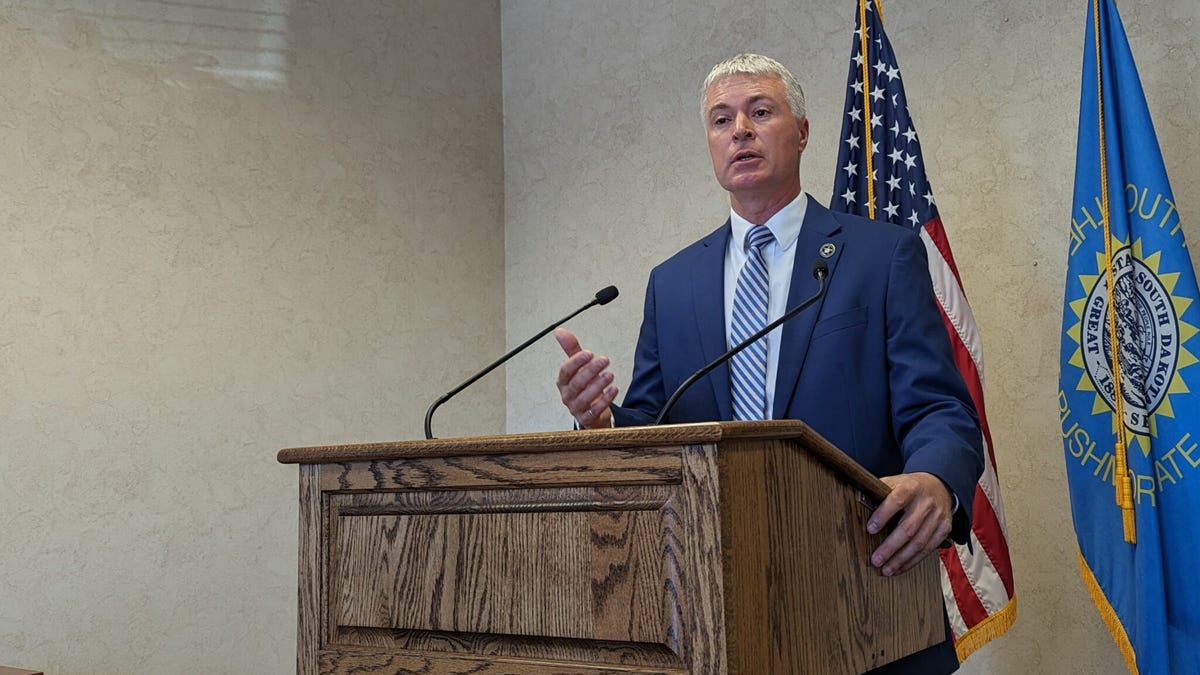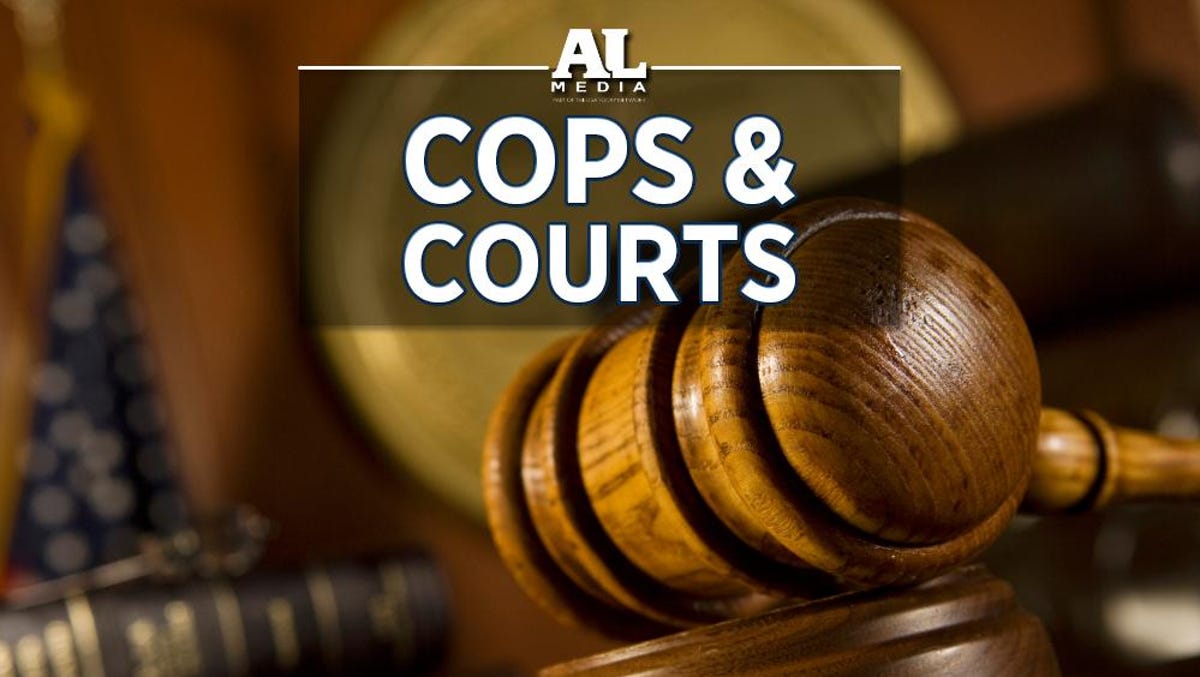South Dakota
Dakota Valley edges Brandon Valley, Yankton drops pitcher's duel to Blair in Lewis & Clark pool play finale

YANKTON, S.D. (Dakota News Now) – Pool play came to a close at the 22nd annual Lewis & Clark Legion Baseball Classic with some tight ballgames across the four host sites on Saturday.
Click on the video viewer for highlights from:
-Dakota Valley’s 8-7 victory over Brandon Valley
-Blair (NE) winning a 1-0 pitcher’s duel over Yankton
Semifinals for the tournament tomorrow at Riverside Field in Yankton are set. Yankton Pool champion Blair (NE) will face Hartington Pool champion Sioux Falls West in the first semifinal at 11:00 AM. Following that Crofton Pool champion Sioux Falls East will take on Vermillion Pool champion Lincoln SE at 1:00 PM.
The winner of the two semifinal games will square off at 3:30 PM for the Lewis & Clark Classic championship.
Copyright 2024 Dakota News Now. All rights reserved.

South Dakota
South Dakota attorney general unveils package of new laws for 2025 legislative session

Boys and men are also victims of sex trafficking
Could this be the beginning of a broader reckoning for male victims of this crime?
South Dakota Attorney General Marty Jackley hopes to prevent and catch future criminal conduct by state employees with new reporting requirements, protections for whistleblowers and a bigger role for the state auditor, according to a package of legislation he released Tuesday.
Jackley unveiled seven bills for lawmakers to consider during the annual legislative session that kicks off next Tuesday at the Capitol in Pierre.
Jackley’s bills focus on government accountability, human trafficking, prison contraband and probation.
Government accountability
Jackley’s government accountability measures come in response to several prosecutions he began last year against former state employees.
Those cases include allegations of former Department of Revenue employees creating fake vehicle titles to secure loans and avoid excise taxes, a former Department of Social Services employee allegedly embezzling $1.8 million, and a former Department of Public Safety employee allegedly filing fake food-service health inspection records for inspections that were never conducted.
“Protecting taxpayer dollars and restoring the public’s trust in government should be given high priority,” Jackley said Tuesday in a press release.
One of his proposed measures would require state employees in supervisory roles to report suspected unlawful conduct to the attorney general and state auditor. Failure to report suspected violations would be classified as a felony.
Additionally, the attorney general would be required to submit an annual report to lawmakers on the state budget committee outlining the number and outcomes of misconduct reports received.
Another bill seeks to shield state employees from retaliation for reporting misconduct or participating in audits and investigations. The bill would:
- Prohibit state supervisors from discharging, discriminating against or taking any other retaliatory action against whistleblowers.
- Establish a process allowing state employees to file complaints with the attorney general within two years after experiencing retaliation.
- Authorize courts to reinstate employees and award back pay if they suffered illegal retaliation.
A third measure would authorize the state auditor to access all financial records of every state agency to conduct audits, investigate improper conduct and ensure internal controls are in place and maintained.
The fourth bill proposes state agencies conduct mandatory annual risk reviews, with results submitted to the Board of Internal Control. The reviews would assess agencies’ risk management practices and identify vulnerabilities.
Human trafficking
Another proposal would revise human trafficking laws and prohibit the obstruction of their enforcement.
“Human trafficking remains a national concern that we are not immune from, and this legislation strengthens victim protections and enhances our ability to hold offenders accountable,” Jackley said.
The bill would update the definitions of human trafficking in the first degree and second degree and would:
- Establish mandatory minimum prison sentences of 15 years for a first offense and 20 years for a second or subsequent offense of human trafficking in the first degree.
- Establish mandatory minimum prison sentences of five years for a first offense and 10 years for a second or subsequent offense of human trafficking in the second degree.
- Create the new felony crime of obstructing the enforcement of human trafficking laws.
Prison contraband
Jackley’s legislative package also includes measures dealing with contraband in state correctional facilities. Officials with the state Department of Corrections reported finding contraband during a lockdown last year at the penitentiary in Sioux Falls.
Existing laws prohibit inmates from possessing drugs, unapproved prescription drugs, alcohol and weapons. Among other provisions, the proposed legislation would add unapproved cell phones and electronic communication devices to the list of banned items, clarify that employees and other people are prohibited from giving a similar list of items to inmates, and adjust the severity of various penalties for the different types of contraband.
Presumptive probation
Another proposal addresses South Dakota’s presumptive probation system, which mandates that some non-violent offenders receive probation instead of prison time. Jackley’s bill would make re-offenders who were already on probation or parole supervision ineligible for presumptive probation.
The bill also adds those convicted of threatening public officials or fleeing law enforcement to the list of ineligible offenders, as well as sex offenders who violate safety zones.
“Sentencing courts need more flexibility to impose appropriate sentences for certain violent offenders, and those choosing to reoffend while on probation or parole,” Jackley said.
South Dakota Searchlight is part of States Newsroom, the nation’s largest state-focused nonprofit news organization.
South Dakota
Landowners appeal Summit carbon storage decision • South Dakota Searchlight

A group of North Dakota landowners is appealing the state’s approval of an underground carbon storage area for Summit Carbon Solutions, the company attempting to build the world’s largest carbon capture and storage project.
The group represented by Bismarck attorney Derrick Braaten on Thursday filed the appeal in Burleigh County District Court, asserting that the North Dakota Industrial Commission withheld information and violated state law in approving the storage permit plan on Dec. 12.
The permanent underground carbon storage sites in western North Dakota are a key piece of Summit’s planned five-state pipeline network (including South Dakota) capturing greenhouse gas emissions from ethanol plants. Approving the storage wells was one of the last decisions of Gov. Doug Burgum as chair of the Industrial Commission, which also included Attorney General Drew Wrigley and Agriculture Commissioner Doug Goehring.
State schedules public input meetings on Summit carbon pipeline application
The unanimous vote by the commission means that landowners who had not signed an agreement with Summit will be forced to allow the carbon storage on their property.
The landowners assert that the Industrial Commission, which includes the state Department of Mineral Resources, illegally refused to disclose information to landowners under North Dakota open records laws. Braaten and his clients were seeking computer-generated models that predict where the carbon dioxide will go when it is pumped underground for permanent storage.
The appeal says former Department of Mineral Resources Director Lynn Helms refused to provide the models before, during and after public hearings on the case in June, shortly before Helms retired.
The order passed by the Industrial Commission said that if any open records requests were not fulfilled, it is because the Braaten Law Firm did not inform the agency that it had not received the records.
“That’s a lie,” Braaten told the North Dakota Monitor.
The appeal said Braaten’s firm was able to obtain the records in November. Braaten contends the computer models aren’t accurate but landowners were not given a chance to dispute that. He said multiple requests for a rehearing were ignored.
Another issue raised in the appeal are the state’s rules on underground storage. Under a process called amalgamation, if 60% of the landowners in a proposed storage area agree to the plan, the state can force the other 40% to comply.
Summit has obtained more than 92% of the pore space lease agreements across all three areas, according to the order approved in December.
GET THE MORNING HEADLINES.
After the commission’s Dec. 12 decision, Summit Executive Vice President Wade Boeshans said the permits resulted from “years of rigorous scientific study, engineering design, and input from regulators, landowners, and local leaders.”
Braaten also is representing the Northwest Landowners Association that has a separate lawsuit before the North Dakota Supreme Court on the amalgamation issue that he contends is unconstitutional.
He said a ruling on either that lawsuit or the storage decision appeal should clarify the constitutionality of the rules.
Braaten’s law firm also is representing Emmons County in a separate legal challenge to the state Public Service Commission’s approval of the pipeline route through North Dakota. Emmons County and Burleigh County are challenging the PSC’s interpretation of state law that concluded state zoning rules preempt local ordinances on where pipelines are allowed.
Another group of landowners also is appealing the PSC permit decision.
Braaten said those appeals may be combined into one case.
South Dakota
Former South Dakota DSS employee indicted for allegedly stealing voucher to buy groceries

A former South Dakota Department of Social Services employee was indicted on one count of social services fraud Thursday, according to a press release from the South Dakota Attorney General’s Office.
Amalia Escalante Barrientos, 28, allegedly used a stolen DSS voucher to purchase groceries for personal use, according to the press release. The incident occurred at a Brookings business Oct. 11.
The Brookings woman has not yet appeared for an initial hearing, according to Minnehaha County court documents.
According to Open SD, Barrientos’ wage is listed at $26.58 hourly.
If convicted, Barrientos could serve up to one year in the county jail, a $2,000 fine, or both, according to the press release.
-

 Business1 week ago
Business1 week agoThese are the top 7 issues facing the struggling restaurant industry in 2025
-

 Culture1 week ago
Culture1 week agoThe 25 worst losses in college football history, including Baylor’s 2024 entry at Colorado
-

 Sports1 week ago
Sports1 week agoThe top out-of-contract players available as free transfers: Kimmich, De Bruyne, Van Dijk…
-

 Politics1 week ago
Politics1 week agoNew Orleans attacker had 'remote detonator' for explosives in French Quarter, Biden says
-

 Politics1 week ago
Politics1 week agoCarter's judicial picks reshaped the federal bench across the country
-

 Politics6 days ago
Politics6 days agoWho Are the Recipients of the Presidential Medal of Freedom?
-

 Health5 days ago
Health5 days agoOzempic ‘microdosing’ is the new weight-loss trend: Should you try it?
-

 World1 week ago
World1 week agoIvory Coast says French troops to leave country after decades


















